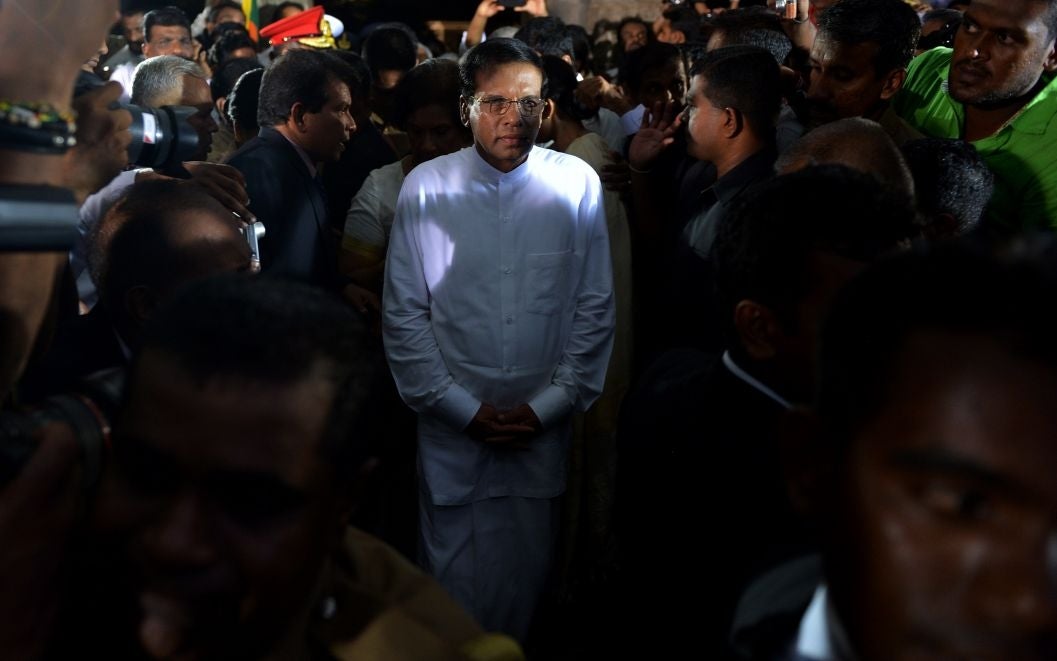Sri Lanka election: Outsider candidate Maithripala Sirisena sworn in after storming to victory in huge upset
The former health minister defeated incumbent Mahinda Rajapaksa who had been president since 2005

Your support helps us to tell the story
From reproductive rights to climate change to Big Tech, The Independent is on the ground when the story is developing. Whether it's investigating the financials of Elon Musk's pro-Trump PAC or producing our latest documentary, 'The A Word', which shines a light on the American women fighting for reproductive rights, we know how important it is to parse out the facts from the messaging.
At such a critical moment in US history, we need reporters on the ground. Your donation allows us to keep sending journalists to speak to both sides of the story.
The Independent is trusted by Americans across the entire political spectrum. And unlike many other quality news outlets, we choose not to lock Americans out of our reporting and analysis with paywalls. We believe quality journalism should be available to everyone, paid for by those who can afford it.
Your support makes all the difference.Sri Lanka’s new president has vowed to scale back powers amassed by his predecessor after being sworn into office today.
Maithripala Sirisena was swept to power in an unpredictable election after he defeated the centre-left incumbent Mahinda Rajapaksa, who had led the country at the head of the Sri Lankan Freedom Party since 2005.
The new president’s election was considered a huge upset in Sri Lankan politics. Polls took place yesterday on 8th January.
Mr Sirisena, once a member of Mr Rajapaska’s ruling party and a health minister in his government, was backed by an all-encompassing opposition group called the New Democratic Front.
The group is comprised of a diverse coalition of political parties including the Sinhalese Buddhist Jathika Hela Urumaya (JHU), the Marxist Janatha Vimukthi Peramuna (JVP) and the Democratic National Alliance (DNA).
Mr Sirisena’s predecessor was criticised for amassing powers and increasing the influence of the office of President of Sri Lanka. He scrapped a two-term limit on his presidency using his parliamentary majority.
"With this victory we will implement the 100-day programme in our election manifesto," Mr Sirisena told cheering crowds in Colombo, the country’s largest city and commercial capital, after his swearing-in ceremony.
He also took the opportunity to criticise state-run media for their conduct during the campaign.
Mr Sirisena had promised to change Sri Lanka's constitution to return the country to a parliamentary system with a prime minister as its leader, and has pledged not to run for president a second time.
A teetotal Buddhist, he has a degree in agriculture and hails from the country’s ancient capital of Polonnaruwam, the centre of the country’s food producing region.
He has cultivated a folksy image, donning elements on traditional Sri Lankan peasant dress while campaigning.
Sri Lanka is a diverse country with a number of ethnic groups. The population is dominated by the large Sinhalese population, which is predominantly Buddhist, but it has a large Tamil minority, who are predominantly Hindu. The country also has sizable Muslim and Christian religious minority populations.
The country’s Tamil population is thought to have turned out in force to vote for Mr Sirisena, largely because they did not like the incumbent Mr Rajapaksa.
The new president received 51.2% of the votes in Thursday's election compared to 47.5% for the incumbent.
Join our commenting forum
Join thought-provoking conversations, follow other Independent readers and see their replies
Comments